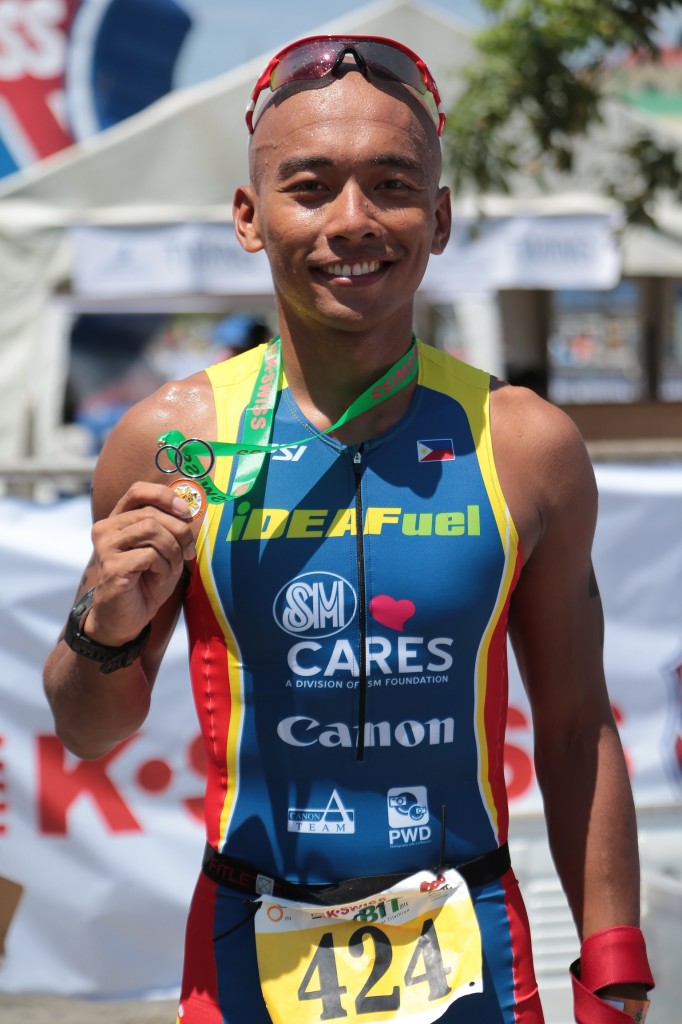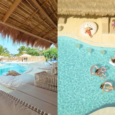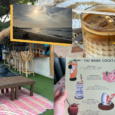Deaf Athlete Teaches When Not to Listen

Hearing-impaired athlete Lester Lagos wears his finisher medal after his race in the National Age Group Championships of K-Swiss ITU Subic Bay International Triathlon last April. He says he will never take for granted the challenges and opportunities, which push him every day to work harder and smarter.
Athlete Lester Lagos said he is out of his element. An elite deaf swimmer, the only sound he can hear is his body, begging him to give up on his newly adopted sport—something he has learned to overcome and ignore.
For two decades, the deaf athlete bagged more than 50 individual swimming awards in local and international competitions. His prowess was also seen at major aquathlon (swimming and running) events organized by SwimBikeRun.ph. In the National Age Group Championships of K-Swiss ITU International Triathlon in Subic last April, he found a new venue to display his talents.
“It was my first time participating. I told myself I couldn’t do it well, and all the time I forced myself to keep going,” Lagos recalled. His determination proved worthwhile when he finished 13th in the Standard Distance (1.5k swim, 40k bike, 10k run) under M30-40 category, out of 92 participants.
But even for an experienced swimmer, victory didn’t come easy. “When I first got into triathlons, I was truly surprised at how my body reacted during the transition from swimming to biking and biking to running,” he said. “The swim to bike transition (T1) is much harder. Personally, I find T1 to be the hardest part of a triathlon.”
Looking back, Lagos summarized his pre-competition training routine: three hours a day, six days a week. “My lungs burn at practice as my body screams for me to stop, but my mind yells louder for me to push through,” he said.
Apart from his training, Lagos needed to attend to his other needs. “I have to be a travel agent, sponsorship manager, and financial planner on top of the many hours I devote to training. This can be overwhelming at times,” he said, adding that his inadequate resources taught him to prepare his training and nutrition program on his own, while asking experienced athletes on proper techniques.
Seeing this, imaging giant Canon, a company active in Persons with Disability welfare, backed his participation in the National Age Group Triathlon Championships along with a few paratriathletes. Alan Chng, president and CEO of Canon, said the country is teeming with prospects that can make it big in international sporting events. “All they need is a little help and our faith in their abilities,” he added.
A member of the Canon Advocacy Team, a group of volunteer photographers who contribute time and skills to give back to the society, Lagos pays forward the support he gets by teaching hearing-impaired toddlers basic swimming lessons and preparing beginner athletes for the open water. “My dream is to be a role model to the deaf young athletic community,” he said.
For Lagos, the National Age Group Triathlon Championships is only the start, setting his sights on two triathlon events this year. “When I do triathlons, it is not about hearing; it is about going. Losing my hearing has given me a positive outlook in life because I learned you can take something so negative and allow positive things to come from it. I am attempting to prove that disabilities are not a hindrance when you put your mind and soul into what you do,” he said. “You need to be proud of what makes you who you are. You can’t put yourself down for something that makes you different.”




